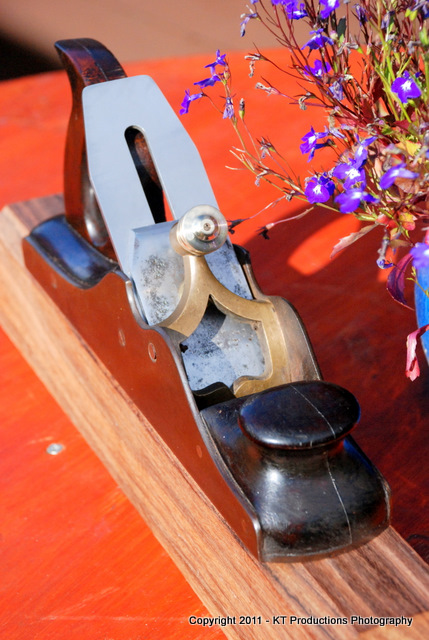studders
Established Member
So you're quite happy to ride any size, make, configuration of Bike?

Not a good analogy. The difference between say a LN and a Stanley fat max, same size, are so little that it really wouldn't make any difference to the job in hand whichever you used. They are effectively identical (almost). Then consider crumbly A2 steel, dropping off handles, high cost, and the fatmax is obviously much better value in terms of usability, without a shadow of doubt.studders":1wdbs8d4 said:So you're quite happy to ride any size, make, configuration of Bike?
kygaloot":1m7y0pps said:James,
Modern manufacturers have yet to equal the steel used in vintage Sheffield cast steel chisels.
Jeff









kygaloot":2ien84ov said:Hello Matthew,
I do not take the position that I stated just because I believe that older is necessarily better, nor do I know the details of manufacturing then or now. (And you know what I mean by "cast steel", i.e. the era in which it was stamped on the chisel.) What I do know is how the steel behaves on the stone and on wood. I have experienced the space age steels manufactured in what others have described as very sophisticated technological environments. While some of them are good, and certainly better than the dreck produced in the 1970's, it is my opinion as a user, that there is still something missing. I do not know what it is. With my Butcher, Charles Taylor, Ward, older Marples, and Sorby chisels, the steel feels "buttery", very fine grained, takes an edge easily and retains it for a long, long, long time. The only relatively modern western chisels that come close to these are those made in Eskilstuna, Sweden. However, they tend to be rarer and hence more expensive.
So, with all of those wonderful old Sheffield chisels laying about in boot sales at such low prices, why not buy a great tool at a great price, and own a piece of English history? Of course, I understand that it does not help the guy who sells new chisels......
Jeff
kygaloot":3476rxy1 said:Hello Matthew,
With my Butcher, Charles Taylor, Ward, older Marples, and Sorby chisels, the steel feels "buttery", very fine grained, takes an edge easily and retains it for a long, long, long time.
Jeff
matthewwh":1rlasobb said:My point is merely that the assertion that we cannot make the raw material as well as we could then - which would imply that it is now impossible to make tools of this quality, is inaccurate. The Smiths of old would have given their eye teeth for the quality and consistency of raw material that we have today. The thing that has become a bit thin on the ground is their skills to work and heat treat it correctly. Thankfully they have been passed down through apprenticeship and are still being practiced, as anyone who has ever sharpened a Clifton plane iron or Ashley Iles chisel will attest.
Not a chance ! Your chisels will be worthless in 100 years time....as the only wood left will be on/in the trees in your local tree zoo. :mrgreen:bobbybirds":36p8whzu said:...and I kind of like knowing that one day 100 years from now, there is a good chance that my chisels today will be some lucky persons bargain garage sale find, and they will talk about how great tools were "back in the day"...
OK, I see. I am all with you then since Berg, Rosenfors and Jernbolaget (all Eskilstuna chisels) are the only ones i usekygaloot":y5y6sbiu said:Nanowire,
Just to clarify, I was not talking about any contemporary Swedish makers, but Berg, Janport, Gensco, etc.
Jeff
Unless they have wooden handles - which'll presumably make them priceless. :wink:Vann":ko2re8zs said:Not a chance ! Your chisels will be worthless in 100 years time....as the only wood left will be on/in the trees in your local tree zoo. :mrgreen:bobbybirds":ko2re8zs said:...and I kind of like knowing that one day 100 years from now, there is a good chance that my chisels today will be some lucky persons bargain garage sale find, and they will talk about how great tools were "back in the day"...
Alf":liqi212x said:Unless they have wooden handles - which'll presumably make them priceless. :wink:Vann":liqi212x said:Not a chance ! Your chisels will be worthless in 100 years time....as the only wood left will be on/in the trees in your local tree zoo. :mrgreen:bobbybirds":liqi212x said:...and I kind of like knowing that one day 100 years from now, there is a good chance that my chisels today will be some lucky persons bargain garage sale find, and they will talk about how great tools were "back in the day"...
James C":aqhdksc6 said:Right come new year I will be picking up three Ashley Iles in the sizes I need (I did listen Jacob) and then checking ebay/bootsales for Sheffield bargains.
My perfect setup would be to have a number of Sheffield Vintage type chisels for chopping and general use and a the AI's set to a fine degree for perfect paring.
I managed to get the pedestal mounted grinding wheel working in my school, so that problem is solved albeit it temporarily. That should leave some money left over for some other stuff, not sure exactly what yet.
Enter your email address to join: